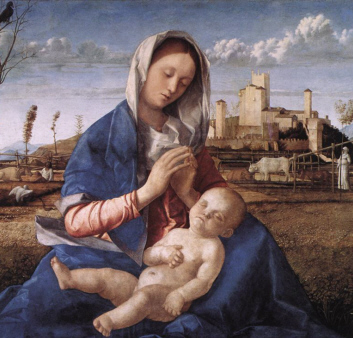
Home
Gregory XVII "Siri" The Pope in Red
The Coming Great Catholic Monarch
St. John Bosco's Dream (Vision) of Hell
Antichrist
(Catholic Prophecy)

The 1949 Edition
Translated by Rev. Boniface Verheyen, OSB
of St. Benedict's Abbey, Atchison, Kansas
| CHAPTER XXXVI : Of the Sick Brethren |
Let a cell be set apart for the sick brethren, and a God-fearing, diligent, and careful attendant be appointed to serve them. Let the use of the bath be offered to the sick as often as it is useful, but let it be granted more rarely to the healthy and especially the young. Thus also let the use of meat be granted to the sick and to the very weak for their recovery. But when they have been restored let them all abstain from meat in the usual manner.
But let the Abbot exercise the utmost care that the sick are not neglected by the Cellarer or the attendants, because whatever his disciples do amiss falleth back on him.
| CHAPTER XXXVII : Of the Aged and Children |
| CHAPTER XXXVIII : Of the Weekly Reader |
Let the deepest silence be maintained that no whispering or voice be heard except that of the reader alone. But let the brethren so help each other to what is needed for eating and drinking, that no one need ask for anything. If, however, anything should be wanted, let it be asked for by means of a sign of any kind rather than a sound. And let no one presume to ask any questions there, either about the book or anything else, in order that no cause to speak be given [to the devil] (Eph 4:27; 1 Tm 5:14), unless, perchance, the Superior wisheth to say a few words for edification.
Let the brother who is reader for the week take a little bread and wine before he beginneth to read, on account of Holy Communion, and lest it should be too hard for him to fast so long. Afterward, however, let him take his meal in the kitchen with the weekly servers and the waiters. The brethren, however, will not read or sing in order, but only those who edify their hearers.
| CHAPTER XXXIX : Of the Quantity of Food |
If, however, the work hath been especially hard, it is left to the discretion and power of the Abbot to add something, if he think fit, barring above all things every excess, that a monk be not overtaken by indigestion. For nothing is so contrary to Christians as excess, as our Lord saith: "See that your hearts be not overcharged with surfeiting" (Lk 21:34).
Let the same quantity of food, however, not be served out to young children but less than to older ones, observing measure in all things.
But let all except the very weak and the sick abstain altogether from eating the flesh of four-footed animals.
| CHAPTER XL : Of the Quantity of Drink |
Although we read that wine is not at all proper for monks, yet, because monks in our times cannot be persuaded of this, let us agree to this, at least, that we do not drink to satiety, but sparingly; because "wine maketh even wise men fall off" (Sir 19:2). But where the poverty of the place will not permit the aforesaid measure to be had, but much less, or none at all, let those who live there bless God and murmur not. This we charge above all things, that they live without murmuring.
Continue to the...
|
| Return to top of page |
| Bookmark this site |

© StGemma.com Web Productions Inc. 2005-2011. All rights reserved.